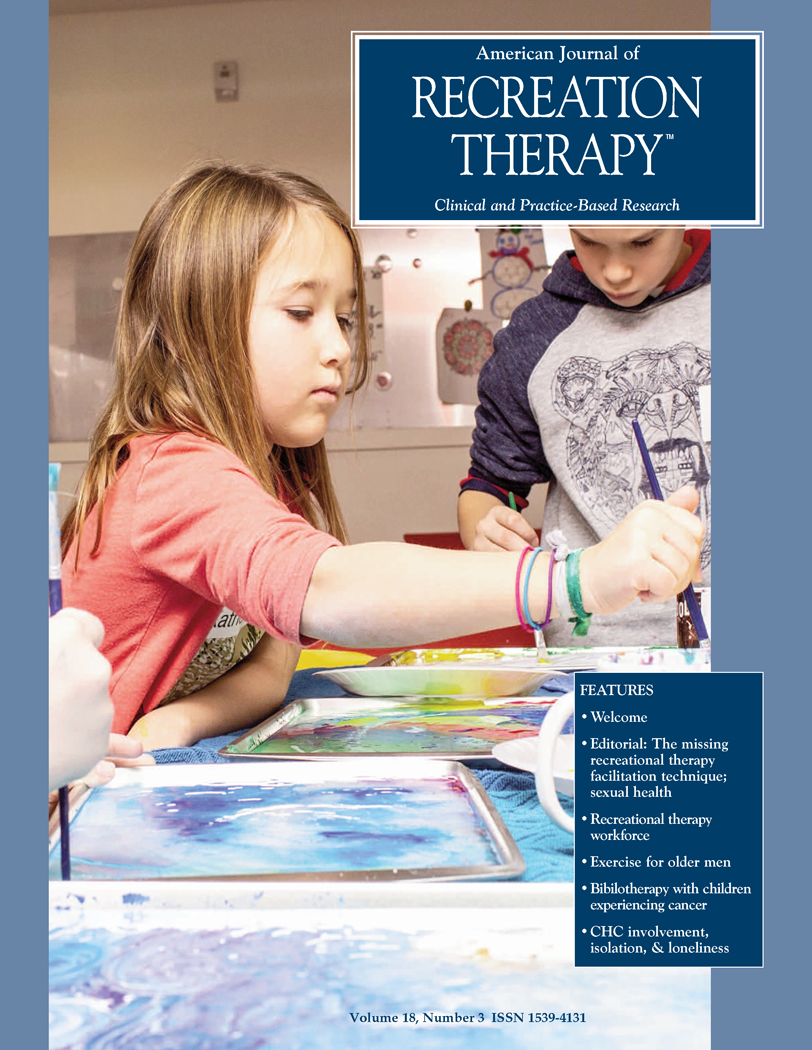Bibliotherapy as a recreational therapy intervention in pediatric oncology
DOI:
https://doi.org/10.5055/ajrt.2019.0193Keywords:
bibliotherapy, oncology, pediatric, recreational therapist, coping, anxietyAbstract
Objective: To examine the literature, facilitate understanding of the intervention and contribute to the evidence-based practice on the use of bibliotherapy with children who have cancer to facilitate coping skills for anxiety.
Methods: A literature review was conducted to examine the practice of bibliotherapy when used with children who have cancer and implications for recreational therapy practice were developed.
Results: While the research on bibliotherapy is limited in recreational therapy literature, there is evidence that it can reduce anxiety and facilitate coping skills for children living with cancer.
References
Dapier J: Prescriptions for joy: Librarians, collections, and bibliotherapy in pediatric hospital settings. Public Libr. 2016; 55(4): 24-27.
Schneider NM, Peterson M, Gathercoal KA, et al.: The effect of bibliotherapy on anxiety in children with cancer. Int J Child Health Hum Dev. 2013; 6(3): 337-345.
Tielsch-Goddard A: Children’s books for use in bibliotherapy. J Pediatr Health Care. 2011; 25: 57-61.
Robinson S, Hughes K, Manning K: Children’s books: A resource for children’s nursing care. Paediatr Nurs. 2002; 14(5): 26-31.
Mayo Clinic: Cancer. Available at https://www.mayoclinic.org/diseases-conditions/cancer/symptoms-causes/syc-20370588. Accessed November 20, 2018.
Gupta RC: Childhood cancer, 2014. Available at https://kidshealth.org/en/parents/cancer.html?WT.ac=ctg#catcancer. Accessed November 20, 2018.
National Cancer Institute: NCI dictionary of cancer terms—Childhood cancer. Available at https://www.cancer.gov/publications/dictionaries/cancer-terms/def/childhoodcancer. Accessed October 25, 2018.
American Cancer Society: Finding cancer in children. Available at https://www.cancer.org/cancer/cancer-inchildren/finding-childhood-cancers-early.html. Accessed October 25, 2018.
American Cancer Society: Treating children with cancer, 2016. Available at https://www.cancer.org/cancer/cancer-inchildren/how-are-childhood-cancers-treated.html. Accessed October 25, 2018.
Lewandowska M: Social relations and pediatric cancer: The struggles of adolescent cancer patients. Available at https://steinhardt.nyu.edu/appsych/opus/issues/2013/fall/lewandowska. Accessed October 25, 2018.
Compas BE, Desjardins L, Vannatta K, et al.: Children and adolescents coping with cancer: Self- and parent reports of coping and anxiety/depression. Health Psychol. 2014; 33(8): 853-861.
Hildenbrand AK, Clawson KJ, Alderfer MA, et al.: Coping with pediatric cancer. J Pediatr Oncol Nurs. 2011; 28(6): 344-354.
Margherita G, Martino ML, Recano F, et al.: Invented fairy tales in groups with onco-hematological children. Child Care Health Dev. 2013; 40(3): 1-16.
Anglin C: Providing pediatric psychosocial support through patient library services in an outpatient hematology/ oncology clinic. Prim Psychiatry. 2008; 15(7): 78-83.
Marcus J: Psychosocial issues in pediatric oncology. Ochsner J. 2012; 12(3): 211-215.
Wonders & Worries: Child developmental stages, 2018. Available at https://www.wondersandworries.org/for-parents/child-developmental-stages/. Accessed November 1, 2018.
Forsner M, Jansson L, Sorlie V: The experience of being ill as narrated by hospitalized children aged 7-10 years with short-term illness. J Child Health Care. 2005; 9(2): 153-165.
Ander M, Wikman A, Ljotsson B, et al.: Guided internet-administered self-help to reduce symptoms of anxiety and depression among adolescents and young adults diagnosed with cancer during adolescence (U-CARE: YoungCan): A study protocol for a feasibility study. BMJ Open. 2017; 7: e013906.
National Cancer Institute: Adjustment to cancer: Anxiety and distress, 2018. Available at https://www.cancer.gov/about-cancer/coping/feelings/anxiety-distress-pdq. Accessed October 24, 2018.
Adamo SMG, Serpieri SA, De Falco R, et al.: Tom Thumb in hospital: The fairy tale workshop in a paediatric oncology and haematology ward. Psychodyn Pract. 2008; 14(3): 263-280.
Jake L: Bibliotherapy applications for recreation therapy. Available at http://www.recreationtherapy.com/articles/bibliotherapy.htm. Accessed September 15, 2018.
Mendel MR, Harris J, Carson N: Bringing bibliotherapy for children to clinical practice. J Am Acad Child Psychol. 2016; 55(7): 535-537.
Gladding ST, Gladding C: The ABCs of bibliotherapy for schools counselors. Sch Couns. 1991; 39(1): 7-13.
Heath MA, Sheen D, Leavy D, et al.: Bibliotherapy: A resource to facilitate emotional healing and growth. Sch Psychol Int. 2005; 26(5): 563-580.
Lucas CV, Soares L: Bibliotherapy: A tool to promote children’s psychological well-being. J Poet Ther. 2013; 26(3): 137-147.
Cook KE, Earles-Vollrath T, Ganz JB: Bibliotherapy. Interv Sch Clin. 2006; 42(2): 91-100.
Schlenther E: Using reading therapy with children. Health Libr Rev. 1999; 16: 29-37.
Bouchard S, Gervais J, Gagnier N, et al.: Evaluation of a primary prevention program for anxiety disorders using story books with children aged 9-12 years. J Prim Prev. 2003; 34: 345-358.
American Therapeutic Recreation Association Website: About ATRA. Available at https://www.atra-online.com/what/FAQ. Accessed November 8, 2018.
Stumbo, NJ: Systematic reviews part I: How to conduct systematic reviews for evidence based practice. Ann Ther Recreat. 2003; 12: 29-45.
Hershey MK, Boris, JM, Blodgea, R: Oncology… Stupology… I Want to Go Home. Cochranville, PA: Butterfly Press, 1999.
Sposito AMP, Silva-Rodrigues FM, de Cassia Sparapani V, et al.: Coping strategies used by hospitalized children with cancer undergoing chemotherapy. J Nurs Scholarsh. 2015; 47(2): 143-151.
Montgomery P, Maunders K: The effectiveness of creative bibliotherapy for internalizing, externalizing, and prosocial behaviors in children: A systematic review. Child Youth Serv Rev. 2015; 55: 37-47.
Jack SJ, Ronan KR: Bibliotherapy practice and research. Sch Psychol Int. 2008; 29(2): 161-182.
Pardeck JT: Bibliotherapy and cancer patients. Fam Ther. 1992; 19(3): 223-232.
American Cancer Society: Key statistics for childhood cancers. Available at https://www.cancer.org/cancer/cancer-in-children/key-statistics.html. Accessed November 15, 2018.
Austin DR: Therapeutic Recreation Processes and Techniques: Evidence-Based Recreational Therapy. 8th ed. Champaign, IL: Sagamore/Venture Publishing, 2018.
Porter HR, ed.: Recreational Therapy Basics, Techniques and Interventions. Enumclaw, WA: Idyll Arbor, 2015.
DeVries D, Brennan Z, Lankin M, et al.: Healing with books: A literature review of bibliotherapy used with children and youth who have experienced trauma. Ther Recreat J. 2017; 51(1): 48-74.
DeVries D, Sunden S: Bibliotherapy with children who have a sibling with a disability. J Poet Ther. 2019; 32(3): 135-155.
International Federation for Biblio/Poetry Therapy: Summary of training requirements, 2019. Available at https://ifbpt.org/obtaining-a-credential/getting-trained/. Accessed May 20, 2019.
National Council for Therapeutic Recreation Certification: CTRS professional profile, 2014. Available at https://nctrc.org/wp-content/uploads/2015/02/MM2-ctrsprofessional-profile-brochure.pdf. Accessed May 20, 2019.
Published
How to Cite
Issue
Section
License
Copyright 2000-2025, Weston Medical Publishing, LLC and American Journal of Recreation Therapy. All Rights Reserved.


